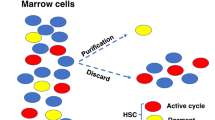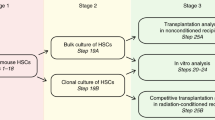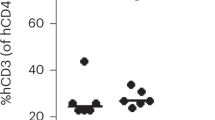Abstract
PREVIOUS work from this laboratory1–4 has suggested that immunologically competent cells are derived from foetal liver during embryonic life and that their ‘functional maturation’, or proliferation, or both, is dependent on the residence of these cells in thymic tissues. The source of these lymphoid precursor cells during adult life is not known. Using chromosomally marked cells, it has been shown, however, that when cell suspensions of various adult lymphoid tissues are injected into lethally irradiated mice only those cells derived from bone marrow are found in the thymus of the host in significant numbers; while the cells from other lymphoid tissues readily proliferate in the peripheral lymphoid tissues of the host, they are only rarely found in the thymus5. In experiments involving the restoration of immunological competence in lethally irradiated thymectomized adult mice, Miller et al.6 concluded that “marrow cell suspensions lack adequate numbers of immunologically competent cells but contain precursor cells” which mature under the influence of the thymus. Furthermore, Feldman and Globerson7 have reported work which suggests that the immunological reactivity manifested by thymectomized mice which have been lethally irradiated, but protected with bone marrow cells and restored to immunological competence with an allogeneic thymic graft, may be due to the donor marrow cells rather than to cells from the thymic graft. Taken together, these results suggest that bone marrow is the source of potential immunologically competent cells in the adult. It is the purpose of this communication to present data which suggest that bone marrow may be the major, or perhaps sole, source of lymphoid precursor cells in the adult mouse.
This is a preview of subscription content, access via your institution
Access options
Subscribe to this journal
Receive 51 print issues and online access
$199.00 per year
only $3.90 per issue
Buy this article
- Purchase on Springer Link
- Instant access to full article PDF
Prices may be subject to local taxes which are calculated during checkout
Similar content being viewed by others
References
Tyan, M. L., and Cole, L. J., Transplantation, 1, 347 (1963).
Tyan, M. L., and Cole, L. J., Transplantation, 2, 241 (1964).
Tyan, M. L., Science, 145, 934 (1964).
Tyan, M. L., and Cole, L. J., Transplantation (in the press).
Ford, C. E., and Micklem, H. S., Lancet, i, 359 (1963).
Miller, J. F. A. P., Leuchars, E., Cross, A. M., and Dukor, P., Ann. N.Y. Acad. Sci., 120, 205 (1964).
Feldman, M., and Globerson, A., Ann. N.Y. Acad. Sci., 120, 182 (1964).
Gorer, P. A., and Boyse, E. A., Immunology, 2, 182 (1959).
Author information
Authors and Affiliations
Rights and permissions
About this article
Cite this article
TYAN, M., COLE, L. Bone Marrow as the Major Source of Potential Immunologically Competent Cells in the Adult Mouse. Nature 208, 1223–1224 (1965). https://doi.org/10.1038/2081223a0
Issue Date:
DOI: https://doi.org/10.1038/2081223a0
This article is cited by
-
Histochemistry of the spleen and thymus in runt disease
Bulletin of Experimental Biology and Medicine (1972)
-
Relationship between Thymus-dependent Cells and Humoral Immunity
Nature (1970)
Comments
By submitting a comment you agree to abide by our Terms and Community Guidelines. If you find something abusive or that does not comply with our terms or guidelines please flag it as inappropriate.



